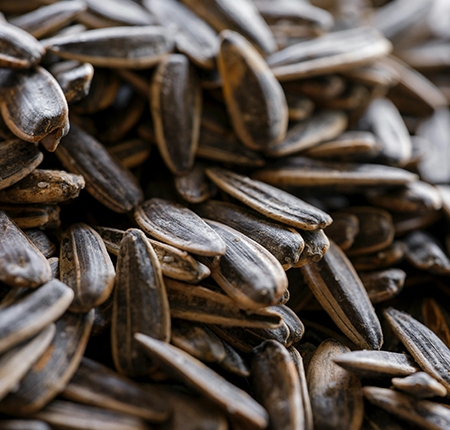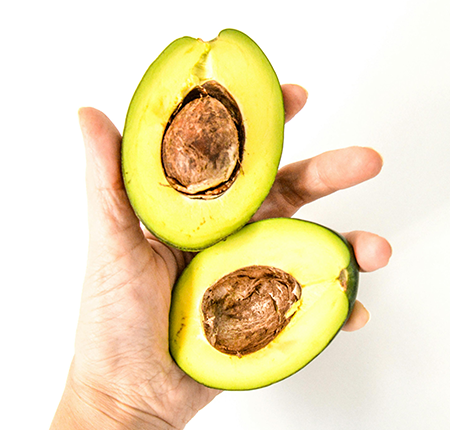
Where do you think the secret to your skin's youthful appearance lies? The truth is that skin needs support from the inside and the outside, and vitamin E, which is found in both food and cosmetics, is among the most important allies in your skincare ritual.
With a strong antioxidant effect, vitamin E is one of the chemical compounds that plays an essential role in maintaining the elasticity and natural glow of the skin. Find out in our article how it works and which foods can help you enjoy its benefits.
What is vitamin E?
Vitamin E is a fat-soluble vitamin, meaning it dissolves in fats and oils, allowing the body to temporarily store it and use it as needed. It actually refers to 8 different chemical compounds, known as tocopherols, but alpha-tocopherol is the most active of these and the one the body uses the most.
Dubbed the “fertility vitamin,” vitamin E can be absorbed from food or dietary supplements and is often used in cosmetic products due to its benefits for skin and hair. It is a nutrient with multiple roles in the body, helping to maintain skin hydration and elasticity, supporting heart, muscle, brain and reproductive health, and may even help prevent aging due to its antioxidant effect.
Vitamin E - Role & benefits for the body
Vitamin E contributes to the proper functioning of the body in many ways, having positive effects on the skin, vital organs, the immune system and overall health. Here are some of the main ways in which vitamin E supports your body every day:
Vitamin E is a powerful antioxidant
Vitamin E protects you against free radicals, those substances that can cause cell damage and damage your tissues, increasing your susceptibility to various health problems. This antioxidant effect supports the health of your skin, muscles, and organs, supporting the vitality of your entire body.
Vitamin E contributes to cardiovascular health
Vitamin E helps dilate blood vessels and can reduce blood pressure, providing cardiovascular health benefits. Adequate intake can prevent blood clots, supporting healthy circulation and optimal heart function. This has been confirmed by research that has linked high vitamin E intake to a lower risk of cardiovascular disease.

Vitamin E helps support the immune system
Through its antioxidant properties, vitamin E helps protect cells and supports the immune system. This helps the body fight infections and bacteria more effectively and maintain a healthy immune response.
Vitamin E for skin and hair
Vitamin E can improve skin hydration and elasticity and can help maintain healthy, shiny hair. That's why it's often included in skin and hair care creams, oils, and serums. In addition, vitamin E is known for its anti-aging effects and can stimulate the regeneration of inflamed skin in cases of acne, eczema, or burns.
Vitamin E helps the nervous system and brain
By protecting nerve cells from the effects of free radicals, vitamin E supports cognitive functions such as memory, attention, perception, and decision-making. Adequate consumption can support brain and nervous system health.
Although research has not yet confirmed this, there are hypotheses that associate high doses of vitamin E with a possible delay in the progression of Alzheimer's disease in people diagnosed with a mild or moderate form.
Vitamin E improves fertility
The reason vitamin E is also known as the “fertility vitamin” is that it can support the normal functioning of the endocrine glands. These play an important role in reproductive health and help maintain a healthy menstrual cycle.
In women of childbearing age , vitamin E protects eggs against oxidative stress and supports the regulation of estrogen and progesterone levels, helping to thicken the uterine lining to facilitate implantation. In both men and women, vitamin E deficiency can have negative effects on reproductive functions and fertility.
That's why, before starting fertility treatment or to support a balanced menstrual cycle, vitamin E supplementation is usually recommended. You can give your body even more support throughout the menstrual cycle with natural intimate care products that put your health and daily comfort first.
Vitamin E protects the liver
Once absorbed by the small intestine, vitamin E supports normal liver function and helps protect the liver against the effects of oxidative stress. Beneficial effects have been observed especially in patients diagnosed with non-alcoholic fatty liver disease.
Natural sources of vitamin E
Vitamin E is found naturally in numerous foods, both of plant and animal origin.
The richest sources are foods rich in healthy fats such as seeds, nuts, vegetable oils, eggs, fatty fish, and milk.
Vitamin E is also found in fruits and vegetables such as kiwi, mango, bell peppers, avocado, broccoli or cooked spinach, as well as in whole grains.
How much vitamin E should you consume - Recommended daily dose
The recommended daily dose differs for each person depending on age, lifestyle and, in the case of women, stages such as pregnancy and breastfeeding.
Adequate intake is essential for healthy skin and hair, the immune system, and optimal body function, and most people absorb a sufficient amount directly from their diet.
But there are also people on a low-fat diet or diagnosed with various conditions who may need supplements to reach their daily requirements. If you have any doubts, always talk to your doctor to receive personalized recommendations based on your own needs.

How much vitamin E should an adult consume?
According to WbMD, a healthy adult needs to consume approximately 15 mg of vitamin E per day. This amount can be obtained from food, but supplements can supplement the nutrient intake needed to protect cells against free radicals.
How much vitamin E should a teenager consume?
Adolescents need about 11–15 mg of vitamin E per day. Between the ages of 9 and 13, a minimum of 11 milligrams is required. From the age of 14, they should consume about 15 mg of vitamin E, the same as adults. Regular consumption of foods rich in vitamin E supports harmonious development and cellular protection during the growth period.
How much vitamin E should a pregnant woman consume?
Pregnant women need approximately 15 mg of vitamin E per day to support fetal development and their own health. Vitamin E contributes to the functioning of the reproductive system and cell protection during pregnancy .
How much vitamin E should a breastfeeding woman consume?
During breastfeeding , the recommended dose increases to approximately 19 mg per day. This change occurs to ensure both the mother's vitamin E needs and the baby's nutritional intake.
How much vitamin E should a child consume?
Children need lower doses, which vary depending on their age. Children between the ages of 1 and 3 need about 6 mg/day. From the age of 4 to 8, about 7 mg/day is recommended. Adequate vitamin E intake in childhood contributes to the healthy development of the immune system and body cells.
Vitamin E deficiencies
Vitamin E deficiency is rare because this nutrient is found in many foods and can be temporarily stored in the body. However, there are certain conditions that can cause a deficiency.
In the long term, insufficient intake can affect the skin, hair, and immune system and can lead to anemia, weakened reflexes, blindness, dementia, and other serious neurological problems.
Signs of vitamin E deficiency include difficulty walking and coordinating movements, vision problems, numbness, a weakened immune system, and a general feeling of malaise.
Vitamin E overdose and contraindications
Vitamin E plays an essential role in the proper functioning of the body, but that doesn't mean you should consume it excessively. In too large amounts, it can cause stomach cramps, nausea, diarrhea, and weakness.
In rare cases of overdose, vitamin E can prevent the absorption of vitamin K, which means it can increase the risk of bleeding. It is very important to consult your doctor before taking any type of supplement and always respect the recommended daily dose.
Vitamin E in cosmetics
Due to its antioxidant effect, vitamin E is a frequently used ingredient in anti-aging cosmetics and more. It does not completely stop the aging process, but it can slow it down and fade its effects.
Used in creams, serums, lotions, and oils for the skin and body, vitamin E is believed to help increase skin hydration levels and help keep it soft and supple. It can also support blood circulation, skin cell growth, and reduce irritation caused by external aggressions.
Vitamin E supplements
For people who don't get enough vitamin E from their diet, supplements can be an effective way to get the recommended daily dose. These supplements come in the form of capsules, tablets, drops, or oils, sometimes in combination with other vitamins and minerals.
It is important to consult your doctor before taking any type of supplement and not to exceed the recommended dosage.
The difference between natural and synthetic vitamin E
Vitamin E is found naturally in vegetable oils, especially soybean and sunflower oils, and is more easily absorbed by the body. For best results, supplements containing d-alpha-tocopherol, a form identical to the natural form, are generally recommended.
Synthetic supplements contain dl-alpha-tocopherol, a mixture of active and inactive forms, which, while beneficial, are harder for the body to absorb. The synthetic form is created in a laboratory and has about half the biological activity of the natural form.

Frequently Asked Questions about Vitamin E
Often, the information you find online about vitamins and supplements can leave you with a lot of questions. How much to take, where to get them, and how can they really help your skin, hair, and overall health? It's best to discuss all of these aspects with your doctor, who can provide you with personalized recommendations based on your own body's needs.
But if you need a little clarity on how vitamin E works before you head to the office, we've prepared some helpful answers to the most frequently asked questions in this section.
Is vitamin E better from food or supplements?
The natural form of vitamin E found in foods is usually better absorbed by the body. Supplements can be helpful when your diet doesn't provide enough, but you should always consult your doctor and stick to the recommended daily intake.
How long should vitamin E be taken?
The duration of administration depends on your needs and the purpose of supplementation. To support your skin and hair health, immune system and general health, you can assimilate vitamin E daily from food or supplements. During pregnancy or while breastfeeding, it is recommended to follow your doctor's instructions.
How do I choose the best vitamin E supplement?
Choose quality supplements, preferably those containing the natural form of vitamin E (d-alpha-tocopherol). Check the dosage, the presence of other vitamins and minerals, and consult your doctor before starting.
What happens if I take too much vitamin E?
Overdose of vitamin E can interfere with the absorption of vitamin K and increase the risk of bleeding. Therefore, it is important to stick to the recommended daily dose and only take supplements under the guidance of a specialist.
Does Vitamin E prevent aging?
Vitamin E does not completely stop skin aging, but it can slow down this natural process. Thanks to its antioxidant properties, it helps protect cells against the action of free radicals. An optimal intake of vitamin E can support the youthful appearance of skin and have anti-aging effects, especially when combined with a proper skincare routine and a balanced diet.
How does vitamin E deficiency manifest itself in children?
Vitamin E deficiency is rare in children, but it can cause muscle weakness, coordination problems, fatigue, and immune system disorders. A diet rich in nuts, seeds, vegetables, and healthy oils is essential for achieving the necessary intake of vitamin E.
Photo source: Pexels.com






















